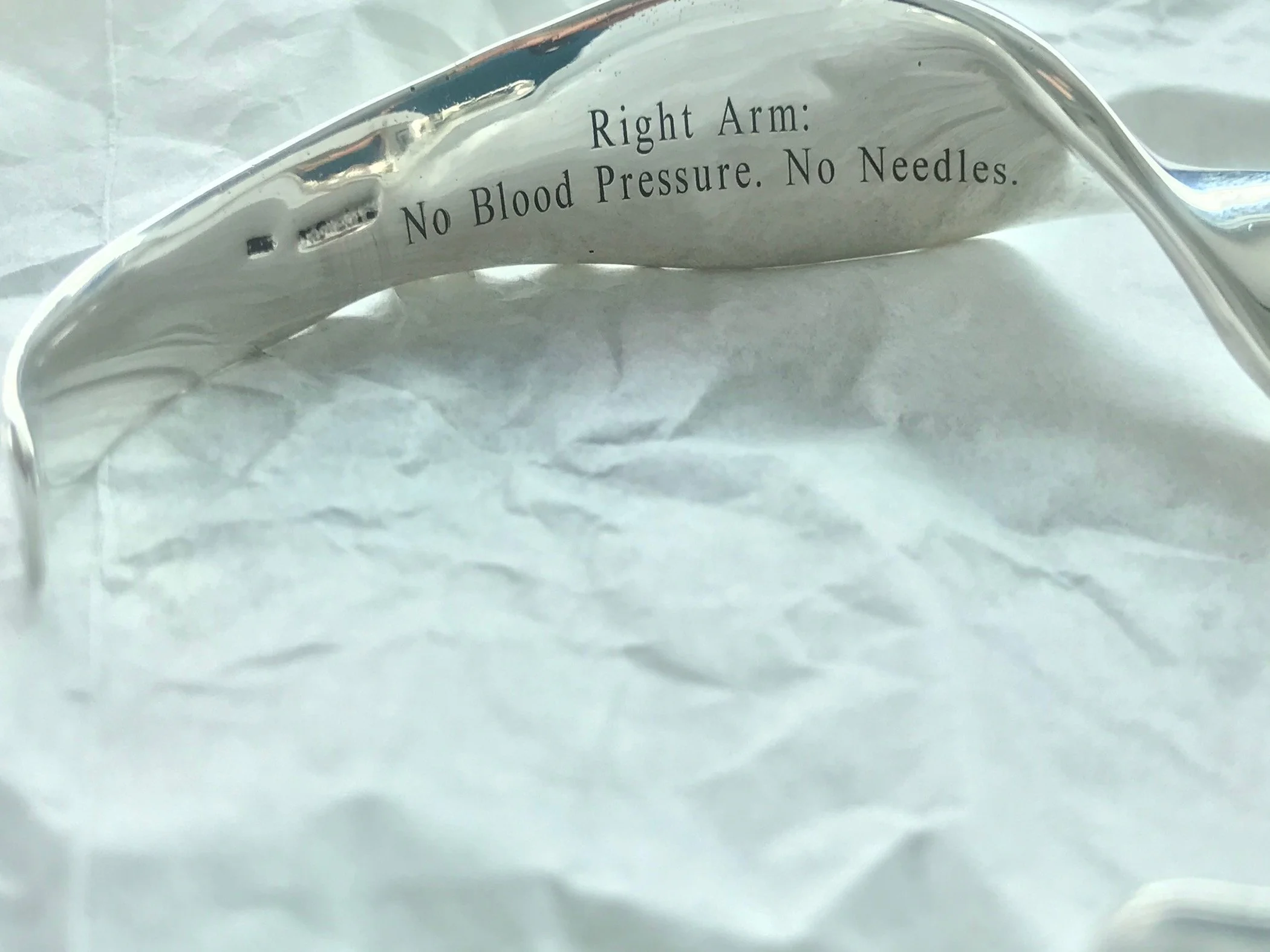Breast Cancer and Lymphedema Bracelets
Breast cancer is a common disease that affects many women worldwide. One of the potential complications of breast cancer treatment is the development of lymphedema, a condition that causes swelling in the arms or legs due to a buildup of lymphatic fluid. Wearing a medical ID bracelet can be beneficial for women who have had breast cancer treatment and are at risk of developing lymphedema. Here are some reasons why:
Alerting Medical Professionals to the Risk of Lymphedema
When a person has had breast cancer treatment, medical professionals need to be aware of the risk of lymphedema. Lymphedema can occur after surgery, radiation therapy, or chemotherapy, and it can be challenging to treat. Wearing a medical ID bracelet can help medical professionals identify a person's risk of developing lymphedema and take precautions to prevent it.
Providing Critical Medical Information
A medical ID bracelet can provide essential medical information about a person's breast cancer treatment history, such as the type of surgery, radiation therapy, or chemotherapy they have received. This information can be crucial in the event of an emergency, as it can help medical professionals provide appropriate treatment quickly.
Preventing Misdiagnosis and Inappropriate Treatment
Lymphedema can present with symptoms that are common to other medical conditions, such as cellulitis or deep vein thrombosis. Wearing a medical ID bracelet can help prevent medical professionals from misdiagnosing a person with lymphedema and providing inappropriate treatment.
Reminding the Person to Take Precautions
Women who have had breast cancer treatment and are at risk of developing lymphedema need to take precautions to prevent the condition from developing. These precautions include avoiding tight clothing, wearing compression garments, and not carrying heavy bags with the affected arm. Wearing a medical ID bracelet can serve as a constant reminder for the person to take these precautions and avoid activities that could exacerbate their risk of developing lymphedema.
Providing Peace of Mind
Wearing a medical ID bracelet can provide peace of mind to women who have had breast cancer treatment and are at risk of developing lymphedema. The bracelet serves as a constant reminder that the person has a medical condition that requires special attention, and that medical professionals need to be aware of this condition in the event of an emergency.
Providing Emergency Contact Information
A medical ID bracelet can include emergency contact information, such as the name and phone number of a person's spouse, family member, or friend. This information can be critical in the event of an emergency, as medical professionals can contact the person's loved ones quickly and provide them with updates on the person's condition.
Breast cancer treatment can have significant physical and emotional impacts on women. One potential complication of breast cancer treatment is the development of lymphedema, a condition that causes swelling in the arms or legs. Wearing a medical ID bracelet can be beneficial for women who have had breast cancer treatment and are at risk of developing lymphedema. The bracelet can alert medical professionals to the risk of lymphedema, provide critical medical information, prevent misdiagnosis, remind the person to take precautions, provide peace of mind, and provide emergency contact information. If you have had breast cancer treatment and are at risk of developing lymphedema, wearing a medical ID bracelet is essential. It can help prevent medical emergencies and ensure that you receive appropriate treatment quickly.
Online Breast Cancer and Lymphedema Resources
BreastCancer.org: This website provides comprehensive information about breast cancer, including diagnosis, treatment options, support resources, and community forums for patients and survivors.
Susan G. Komen: Susan G. Komen is one of the most well-known breast cancer organizations. They offer resources, education, support, and funding for breast cancer research and community programs.
National Breast Cancer Foundation (NBCF): NBCF provides breast health education, early detection resources, and support services for individuals affected by breast cancer.
Living Beyond Breast Cancer (LBBC): LBBC offers programs and resources designed to support individuals diagnosed with breast cancer, as well as their families and caregivers.
Young Survival Coalition (YSC): YSC focuses on addressing the unique needs of young women diagnosed with breast cancer. They provide resources, support, and advocacy for this specific demographic.
Lymphatic Education & Research Network (LE&RN): LE&RN is a nonprofit organization that focuses on raising awareness about lymphatic diseases, including lymphedema. They provide information, support, and advocacy.
National Lymphedema Network (NLN): NLN offers resources, education, and support for individuals with lymphedema, as well as healthcare professionals involved in lymphedema care.
Step Up, Speak Out, Take Charge: This is an initiative by the American Lymphedema Framework Project to provide information and resources about lymphedema for patients, healthcare providers, and the public.
Lymphedema Advocacy Group (LAG): LAG is dedicated to advocating for improved insurance coverage for lymphedema treatment. They work to raise awareness about lymphedema-related issues.
Lymphedema Association of North America (LANA): LANA offers a certification program for lymphedema therapists and provides resources for patients seeking qualified therapists.

